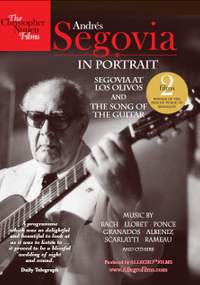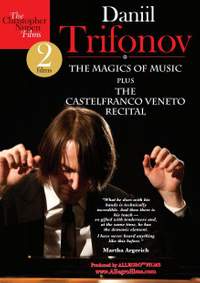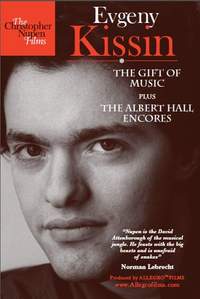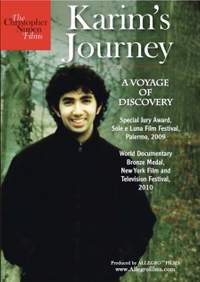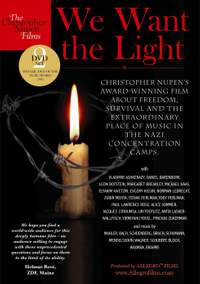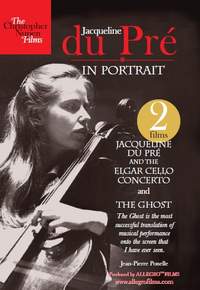They made their first film together, DOUBLE CONCERTO, in 1966 for BBC Television. That film featured Vladimir Ashkenazy, Daniel Barenboim and the English Chamber Orchestra preparing for, and giving, their first public performance together (Mozart’s concerto for two pianos). The film won the Prague and Monte Carlo prizes in the following year and, subsequently, had a decisive and seminal influence on television music programming both in Europe and in the United States.
Two prime factors lay behind the formation of Allegro Films; the invention of the first lightweight, silent, 16mm film cameras and Nupen's perception of what this new combination of silence and mobility could mean to television music programming. Using the lessons which he had learned in the internationally famed Features Department of BBC Radio, he sought to get away from the limitations of television studios by taking the new cameras to musical performers in their natural environment, where they are at their best and their most revealing. In the words of Sir Jeremy Isaacs, the first Chief Executive of the innovative Channel Four Television network in the United Kingdom and later Chief Executive of the Royal Opera House, Covent Garden, "Christopher Nupen pioneered a style of filming musicians and music-making in which his excellence has rarely been equalled and never excelled. Of that genre he is the undoubted master."
By showing aspects of music and music-making that are not generally accessible, even to the concert-going public, Allegro Films put images on the screen that had never been there before. In this way they produced a series of intimate portraits of great performers that have come to be recognised as classics and which have a longevity that is rarely achieved by television programming. For more than five years they had the three top-selling titles in the Warner Brothers classical video catalogue and one of their films, The Trout, with Itzhak Perlman, Pinchas Zukerman, Jacqueline du Pré, Zubin Mehta and Daniel Barenboim, is probably the most frequently broadcast classical music film ever made. Twenty-six years after its first appearance, on its seventh broadcast in Germany (which may be a record in itself), it gained the largest audience of all classical music transmissions on the ARTE network during the first six months of the year - more than 25 years after it was made.
The hallmarks of these films are intimacy, exuberance and insights into musical experience that were previously the private preserve of the great musicians and their close friends. In addition, the films are made at a level of technical expertise which is not usually associated with television music programming. Sir Isaiah Berlin, the Oxford philosopher and historian of ideas described some of them as being "At just about the highest level which television is capable of reaching".
Christopher Nupen describes it as a happy historical accident: a matter of being in the right place at the right time. Many of these musicians were already his friends when the new cameras were invented and this new kind of film became possible. From that day to this Allegro Films has been a pioneer force and built a reputation for producing exceptionally lively films with some of the greatest performing musicians of our time. In the process Allegro Films has demonstrated convincingly that film remembers our great performers in a way that not one of the other media is quite able to match.
In celebration of 25 years of Allegro Films, Channel Four in the United Kingdom, ran a retrospective of Christopher Nupen films at prime time on Saturday evenings. As far as we know, it was the longest retrospective ever devoted to the work of a single director on British television. The films were shown at 9.05pm every Saturday evening for four months and when it was over Channel 4 described it as their biggest success of the year; not in arts broadcasting but over the entire range of their output.
The performers that have appeared in Allegro films include Andrés Segovia, Jacqueline du Pré, Daniel Barenboim, Pinchas Zukerman, Zubin Mehta, Vladimir Ashkenazy, Itzhak Perlman, Nathan Milstein, Isaac Stern, Murray Perahia, Placido Domingo, Gidon Kremer and Evgeny Kissin among others.
Whilst continuing to work with leading performers, Allegro has also turned its attention to composers and thinkers. It has made films about the work, rather than the lives, of Georges Bizet, Ottorino Respighi, Modest Mussorgski, Johannes Brahms, Jean Sibelius, Marc Neikrug, Cristobal Halffter, Ludwig Wittgenstein, Arnold Schoenberg, Tchaikovsky, Schubert and Paganini.
Allegro’s most recent film, We Want the Light won two international prizes in the first half of 2004; Best Editing at the New York Film and Television Festival 2004 and the Jewish Cultural Award for Film and Television 2004, (a prize which in 2003 went to Steven Spielberg and Roman Polanski and in 2004 to Daniel Barenboim, Maxim Vengerov, Christopher Nupen and three others).



